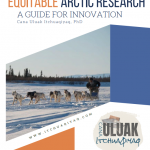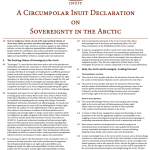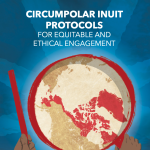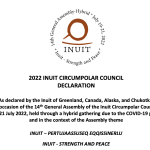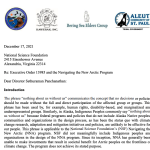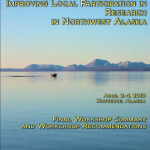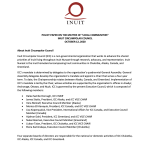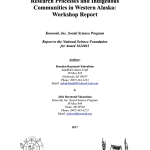Research, Guidance, and Relations
Agents and the Arctic: The Case for Increased Use of Agent-Based Modeling to Study Permafrost
Permafrost thaw is one of the world’s most pressing climate problems, already disrupting lifestyles, livelihoods, economies, and ecosystems in the north, and threatening to spill beyond the boundaries of the Arctic as our planet continues to warm. To examine the effects of permafrost degradation, and increase our understanding of what this phenomenon means for the future of the region (and the world), The Arctic Institute’s new two-part permafrost series aims to analyze the topic from scientific, security, legal, and personal perspectives.
Kawerak-Region Tribal Research Protocols, Guidelines, Expectations & Best Practices
This document represents a Tribal vision from the Kawerak region about some key aspects of what Tribes want to see regarding the world of research. Topics covered include conceptualizing research, research oversight, planning research, conducting research, applying research, and information sharing and control.
Equitable Arctic Research: A Guide for Innovation
This guide on Equity in Arctic Research provides practical strategies for you to create equitable and effective partnerships with Indigenous communities in your research. By using the strategies and resources in this guide, you can work toward:
- Building respectful and long-term relationships with Indigenous communities
- Incorporating Indigenous Knowledges and practices in a respectful and equitable manner
- Achieving more meaningful and successful Arctic research
A Circumpolar Inuit Declaration on Sovereignty in the Arctic
We, the Inuit of Inuit Nunaat, are committed to this Declaration and to working with Arctic states and others to build partnerships in which the rights, roles and responsibilities of Inuit are fully recognized and accommodated.
Circumpolar Inuit Protocols for Equitable and Ethical Engagement
Equitable and ethical engagement and the utilization of Indigenous Knowledge is required to inform research, assessments, monitoring programs, decision-making, policy and governance. Such an approach will ensure that all will have the best available information to make sound decisions that respond to conditions facing the entire global community.
2022 Inuit Circumpolar Council Declaration
Reaffirming that the Inuit Circumpolar Council (ICC) exists as the unified voice for Inuit at the international level. The principal goals of ICC are to strengthen unity among Inuit of the circumpolar region; promote Inuit status, rights, and interests on an international level; develop and encourage long-term policies that safeguard the Arctic environment; and seek full and active partnership in the political, economic, and social development of the Arctic,...
NNA Follow Up Letter
We—federally recognized Tribes and regional Tribal Consortia representing or comprised of over 75 federally recognized Tribes4—are writing to provide additional specific recommendations that can be used by NSF to ensure that NNA funding is spent well and achieves societal benefits.
Improving Local Participation in Research in Nortwest Alaska
In conjunction with the Northwest Arctic Borough, the Chukchi Campus of the University of Alaska Fairbanks organized the Workshop on Improving Local Participation in Research in Northwest Alaska. The National Science Foundation funded the workshop in its continuing effort to improve relations between researchers and local residents. The workshop occurred in Kotzebue April 2-4, 2013.
Research Processes and Indigenous Communities in Western Alaska
Research activities have become a regular occurrence in northern indigenous community life, a major factor influencing policy and management affecting these communities, and a source of various community impacts (positive, negative, and otherwise). Research processes span across the disciplines, including work in the natural sciences (e.g. physical oceanographic work, climatological research, fisheries and marine mammal research) as well as the social sciences (e.g. ethnographic studies, socioeconomic impact studies, and harvest survey research).
Pagination
- Page 1
- Next page
